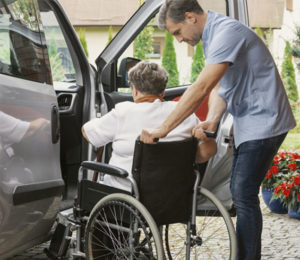What Are ADLs And IADLs And How Do They Relate To Senior Caregiving?
 What are ADLs and IADLs? ADLs, or activities of daily living, are the are the essential daily tasks people do to manage their daily lives and health and live independently. As an adult child, you may recognize that your senior parents or loved ones have difficulty completing everyday tasks. Those tasks are ADLs; learning about them and how ADLs relate to senior care helps you and caregivers provide better independent living care for your loved ones.
What are ADLs and IADLs? ADLs, or activities of daily living, are the are the essential daily tasks people do to manage their daily lives and health and live independently. As an adult child, you may recognize that your senior parents or loved ones have difficulty completing everyday tasks. Those tasks are ADLs; learning about them and how ADLs relate to senior care helps you and caregivers provide better independent living care for your loved ones.
What Is The Difference Between ADLs And IADLs?
The main difference between ADLs and IADLs is the general purpose of the two categories. As mentioned above, ADLs are essential and routine tasks that most people can perform without personal assistance, primarily related to physical needs like personal hygiene or grooming, dressing, eating, and more. Some examples of ADLs include the following:
- Moving from one position to another and walking independently
- Feeding oneself
- Dressing oneself
- Bathing, grooming, and maintaining dental hygiene, nail, and hair care
IADLs, or instrumental activities of daily living, help one live independently in a community. These tasks generally include more complex physical and cognitive functions than ADLs. Examples of instrumental activities of daily living that can help individuals live independently in a community include the following: - Transportation and shopping, either for groceries or clothing
- Managing finances, such as paying bills and managing financial assets
- Cooking and meal preparation
- Housecleaning and home maintenance, such as cleaning kitchens after eating
- Managing communication with others, either in person or through phone calls or mail
- Managing medications and taking them as directed
Depending on various factors, such as living conditions or physical or mental disabilities, many seniors find performing ADLs or IADLs difficult or even impossible. If your senior loved one experiences difficulties completing these daily tasks or activities, you may want to contact a professional caregiver for help.
How Do ADLs And IADLs Relate To Senior Caregiving?
Knowing a senior’s ability to perform ADLs and IADLs is essential to determining the caregiving needs of seniors. First, a significant proportion of seniors in the United States struggle with ADLs, especially individuals with chronic conditions. Because of the various physical and mental challenges people face as they age, seniors are more likely to have issues with these basic activities or skills in their daily lives than younger, healthier adults.
Second, because ADLs and IADLs have different purposes in helping one live independently and because each requires different physical and mental skills, knowing which ones seniors struggle with is vital for caregivers to determine what type of assistance to provide and the level of care needed.
Identifying ADLs And IADLs That Seniors Struggle With
One method that families and caregivers use to determine what care a senior needs is an ADL/IADL check sheet. The check sheet features rows of various ADLs/IADLs and a few columns that signify the level of function a senior has. People can check proficiency levels from “fully independent” to “needs help” to “impossible.” A senior caregiving agency can then review and analyze these check sheets to determine the required level of care and to create an effective care services program for the senior.
Contact Us
Are you a Home Care Worker?
Free Dementia FAQs eBook
The families we serve keep saying great things.
I just wanted to tell you how grateful we are that Neighborly Home Care stepped in & took over taking care of my Dad when we really needed it, no questions asked. Our caregiver has become part of the family and we know we can depend on her being there every day & taking great care of my Dad. He misses her when she’s not there!
— Daughter of an NHC Client
Neighborly Home Care Services Assist Your Loved One in Daily Living Tasks
If your senior loved ones need assistance with daily living activities or maintaining an independent life, Neighborly Home Care can help. We provide top-quality, compassionate caregiving solutions for your loved one. Our transportation, disability, and 24-hour elderly care services are intended to provide seniors with the best care possible. If you have further questions about ADLs and IADLs and how your senior loved ones’ proficiency may affect their caregiving needs, contact us for a consultation about our senior care services and solutions.